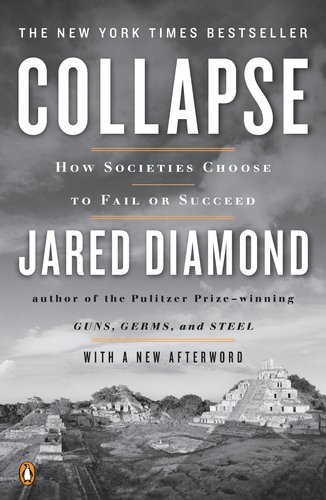Cheap Collapse: How Societies Choose to Fail or Succeed: Revised Edition Discount Review Shop
 Available at Amazon
Available at Amazon
Cheap "Collapse: How Societies Choose to Fail or Succeed: Revised Edition" Discount Review Shop
"Collapse: How Societies Choose to Fail or Succeed: Revised Edition" Overview
In his runaway bestseller Guns, Germs, and Steel, Jared Diamond brilliantly examined the circumstances that allowed Western civilizations to dominate much of the world. Now he probes the other side of the equation: What caused some of the great civilizations of the past to fall into ruin, and what can we learn from their fates? Using a vast historical and geographical perspective ranging from Easter Island and the Maya to Viking Greenland and modern Montana, Diamond traces a fundamental pattern of environmental catastrophe—one whose warning signs can be seen in our modern world and that we ignore at our peril. Blending the most recent scientific advances into a narrative that is impossible to put down, Collapse exposes the deepest mysteries of the past even as it offers hope for the future.
"Collapse: How Societies Choose to Fail or Succeed: Revised Edition" Specifications
Jared Diamond's Collapse: How Societies Choose to Fail or Succeed is the glass-half-empty follow-up to his Pulitzer Prize-winning Guns, Germs, and Steel. While Guns, Germs, and Steel explained the geographic and environmental reasons why some human populations have flourished, Collapse uses the same factors to examine why ancient societies, including the Anasazi of the American Southwest and the Viking colonies of Greenland, as well as modern ones such as Rwanda, have fallen apart. Not every collapse has an environmental origin, but an eco-meltdown is often the main catalyst, he argues, particularly when combined with society's response to (or disregard for) the coming disaster. Still, right from the outset of Collapse, the author makes clear that this is not a mere environmentalist's diatribe. He begins by setting the book's main question in the small communities of present-day Montana as they face a decline in living standards and a depletion of natural resources. Once-vital mines now leak toxins into the soil, while prion diseases infect some deer and elk and older hydroelectric dams have become decrepit. On all these issues, and particularly with the hot-button topic of logging and wildfires, Diamond writes with equanimity.
Because he's addressing such significant issues within a vast span of time, Diamond can occasionally speak too briefly and assume too much, and at times his shorthand remarks may cause careful readers to raise an eyebrow. But in general, Diamond provides fine and well-reasoned historical examples, making the case that many times, economic and environmental concerns are one and the same. With Collapse, Diamond hopes to jog our collective memory to keep us from falling for false analogies or forgetting prior experiences, and thereby save us from potential devastations to come. While it might seem a stretch to use medieval Greenland and the Maya to convince a skeptic about the seriousness of global warming, it's exactly this type of cross-referencing that makes Collapse so compelling. --Jennifer Buckendorff
 Available at Amazon
Available at AmazonCheap "Collapse: How Societies Choose to Fail or Succeed: Revised Edition" Discount Review Shop
"Collapse: How Societies Choose to Fail or Succeed: Revised Edition" Related Products
- Guns, Germs, and Steel: The Fates of Human Societies
- The Third Chimpanzee: The Evolution and Future of the Human Animal (P.S.)
- Environmental Geography: Science, Land Use, and Earth Systems, 3rd Edition
- Questioning Collapse: Human Resilience, Ecological Vulnerability, and the Aftermath of Empire
- Why Is Sex Fun?: The Evolution Of Human Sexuality (Science Masters)
Visit : Best Puzzles Book Buy Graphic Novels Textbooks for Sale

No comments:
Post a Comment